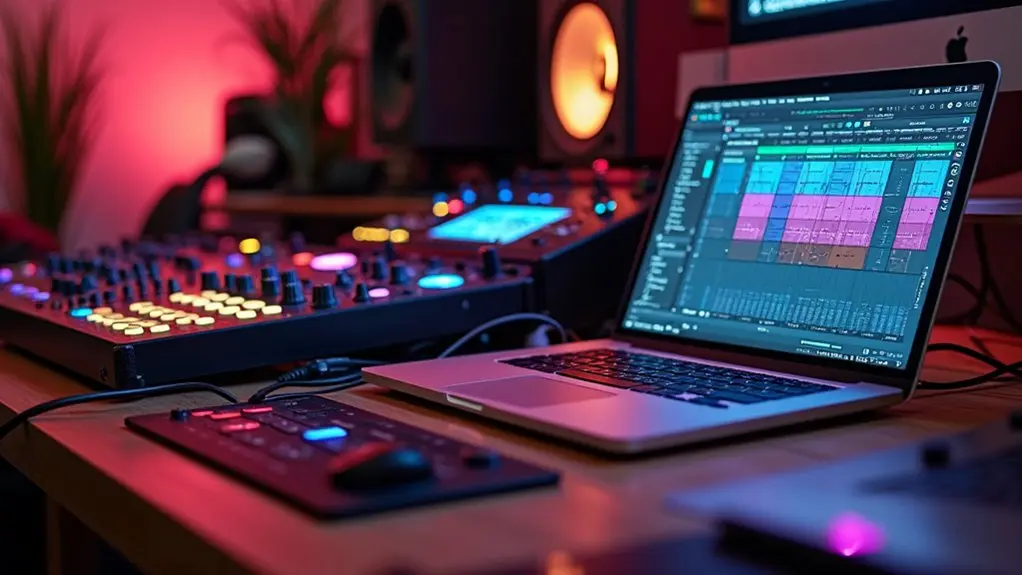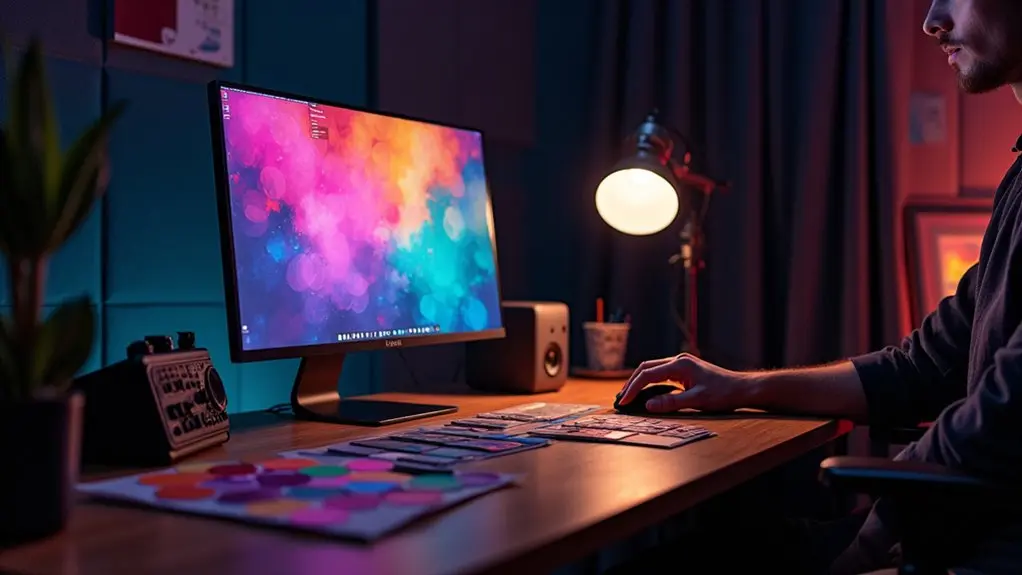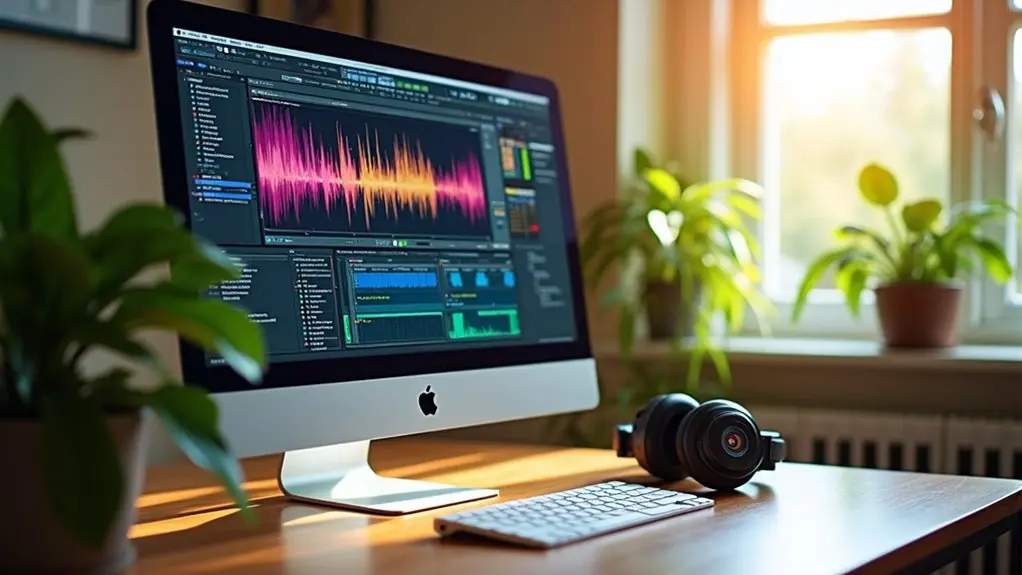Running FL Studio on a Chromebook is technically possible but far from straightforward, due to Chrome OS limitations and limited compatibility with traditional Windows or Mac software. Workarounds like using Linux apps or Crossover require specific Intel or AMD hardware and involve complex installation steps, often leading to reduced functionality or stability. Most users achieve better results with FL Studio Mobile or cloud-based DAWs. Evaluating viable methods and compatible hardware can reveal more practical workflow solutions.
Key Takeaways
- FL Studio 20 cannot be natively installed on Chrome OS, limiting full DAW functionality on most Chromebooks.
- Workarounds like Crossover or Linux (Beta) require Intel/AMD CPUs, advanced setup, and offer mixed stability and compatibility.
- FL Studio Mobile, available on Google Play, is a simplified alternative but lacks VST plugin support and advanced desktop features.
- Cloud-based DAWs (e.g., Soundtrap) and certain Android apps provide practical, Chromebook-friendly music production alternatives.
- Community forums and tutorials offer guidance, but performance and hardware compatibility vary significantly by Chromebook model.
FL Studio Compatibility With Chromebook Devices
Although Chromebooks have gained popularity for their affordability and portability, they present significant limitations for users seeking to run FL Studio.
Traditional DAWs, including FL Studio 20, remain incompatible with Chrome OS, preventing direct installation. Attempts to use Crossover for installing FL Studio on Chromebooks are hindered by uncertain compatibility, as this approach is not universally reliable and often requires advanced command-line operations.
The situation is further complicated by processor constraints; only Chromebooks equipped with Intel or AMD CPUs have a remote possibility of supporting such installations, while devices using ARM64 architecture are entirely unsupported.
As a practical alternative, FL Studio Mobile is available through the Android App Store and Google Play. However, users must recognize the inherent performance and driver limitations that continue to restrict professional DAW workflows on Chromebooks.
Hardware Specifications to Consider for Music Production
Hardware selection plays a critical role in determining the viability of music production on a Chromebook. For ideal workflow and reliability, technical specifications must align with the demands of audio software such as FL Studio.
Industry experts recommend prioritizing the following hardware aspects when selecting a Chromebook for music production:
- Processor: Choose models equipped with Intel or AMD CPUs for superior audio processing capabilities and seamless multitasking.
- Memory (RAM): A minimum of 8GB RAM is essential to prevent latency and application slowdowns during complex music projects.
- Storage: Opt for SSD storage (16GB–64GB) to provide fast file access; consider microSD expansion for additional music data.
- Display & Portability: Select a screen size (10–15.6 inches) that balances visibility and portability—critical for mobile producers.
Installing FL Studio on Chromebook Using Linux Apps
To deploy FL Studio on a Chromebook, users must leverage the Linux (Beta) environment, which enables compatibility with desktop-class applications otherwise unsupported by Chrome OS.
The process begins by enabling Linux apps via System Settings. Only Chromebooks equipped with Intel or AMD CPUs are supported, as ARM64 devices lack compatibility for FL Studio installations.
Installation requires terminal commands, starting with `sudo dpkg –add-architecture i386` to add 32-bit support, followed by `sudo apt update` to refresh repositories.
Critical libraries such as libjpeg62 and libglu1-mesa:i386 should be installed in one command to meet FL Studio’s dependencies.
Post-installation, users must review Chromebook audio settings, ensuring audio input is enabled for peak software performance.
Crossover offers an alternative installation method, discussed separately.
Using Crossover to Run FL Studio on Chrome OS
By utilizing Crossover, Chromebook users gain the ability to run FL Studio 20 within a Windows compatibility layer on Chrome OS, expanding software availability beyond native or Linux-supported applications.
Crossover leverages Intel or AMD CPUs found in most Chromebooks, but requires enabling Linux apps and configuring dependencies through terminal commands.
The installation process for FL Studio involves careful package management within the Linux environment.
However, Crossover operates under a free trial period, and resetting this trial by reinstalling Linux apps results in the loss of user data.
- Enable Linux apps in Chromebook settings to establish the required environment.
- Install Crossover, which facilitates Windows application compatibility, including FL Studio.
- Download and manage the FL Studio installer using Linux terminal commands.
- Monitor the trial period; data loss occurs upon resetting Linux apps for renewed access.
To enhance vocal performance in FL Studio, it’s essential to adjust Retune Speed for pitch correction timing, balancing natural sound with desired effects.
Step-by-Step Commands for FL Studio Installation
Installing FL Studio on a Chromebook requires precise preparation, beginning with enabling Linux support and verifying hardware compatibility.
This section outlines the essential terminal commands needed for a successful setup, including handling required libraries and downloading the installer.
Guidance is also provided on troubleshooting common installation issues that users may encounter during the process.
Preparing Chromebook for Installation
While Chromebook devices are not natively designed for professional audio software, preparing them for FL Studio installation requires specific system prerequisites and configuration steps.
Industry experts highlight the necessity of verifying hardware compatibility and configuring the operating environment to support Linux Apps. The process involves a methodical approach to guarantee FL Studio operates smoothly, utilizing Linux Apps Support and proper architecture.
- Confirm the Chromebook is equipped with an Intel or AMD CPU, as FL Studio is incompatible with ARM64 processors.
- Navigate to System Settings to enable Linux Apps Support, which is essential for executing installation commands.
- Add 32-bit architecture using `sudo dpkg –add-architecture i386`, then refresh package lists with `sudo apt update`.
- Install required libraries, such as `libjpeg62` and `libglu1-mesa:i386`, to satisfy FL Studio’s dependencies and enable audio input.
Essential Terminal Commands Explained
Executing the correct terminal commands is fundamental to successfully installing FL Studio on a Chromebook configured for Linux Apps.
After enabling Linux apps via System Settings, the process begins by adding 32-bit architecture support using `sudo dpkg –add-architecture i386`. This step is crucial, as many dependencies required by FL Studio rely on 32-bit libraries.
Next, updating the package list with `sudo apt update` guarantees access to the latest software sources.
To meet FL Studio’s library requirements, a single terminal command should be used to install key dependencies, including `libjpeg62`, `libnss-mdns:i386`, and `libglu1-mesa:i386`.
Completing these steps establishes a compatible Linux environment, allowing users to proceed with the FL Studio install process on their Chromebook while ensuring all necessary components are present.
Resolving Common Installation Issues
After establishing the necessary Linux environment and dependencies, users often encounter specific challenges when installing FL Studio on a Chromebook. A methodical approach is critical to minimize disruptions during installation, particularly given Chrome OS’s non-native support.
Utilizing Crossover serves as a vital bridge to install FL Studio, but users must ascertain all Linux Apps and dependencies are properly configured. Audio input functionality can also present issues if not enabled during initial setup. Additionally, the Crossover trial period introduces workflow interruptions, as resetting Linux Apps—required to renew the trial—removes all Linux files.
- Enable Linux Apps; add i386 architecture using `sudo dpkg –add-architecture i386`.
- Update with `sudo apt update` and install dependencies like libjpeg62.
- Download and install Crossover; run FL Studio installer through Crossover.
- Activate audio input and monitor the trial period to avoid unexpected data loss.
Exploring FL Studio Mobile on Chromebook
How can Chromebook users effectively harness music production tools without access to traditional desktop DAWs?
FL Studio Mobile offers a practical solution, readily available via the Google Play Store for most Chromebook users. This version of FL Studio is optimized for touch-based workflows, enabling efficient EDM production and pattern-based sequencing.
While it lacks the VST plugin support and advanced features found in the desktop application, FL Studio Mobile compensates with robust MIDI sequencing, basic audio recording, and a familiar interface for users shifting from the desktop environment.
The app’s portability empowers Chromebook users to compose, arrange, and produce music on-the-go, making it a viable alternative for those limited by hardware constraints.
However, users should note its limitations versus full-scale DAW workflows.
Alternative Digital Audio Workstations for Chrome OS
Beyond FL Studio Mobile, Chromebook users can access a range of alternative digital audio workstations, including both cloud-based platforms and mobile DAWs optimized for Chrome OS.
Options such as Soundtrap, Cubasis 3, WalkBand, and n-Track Studio each present unique workflows and compatibility considerations, particularly regarding internet reliance and external hardware support.
Evaluating these alternatives enables users to match their production needs with the technical constraints and capabilities of Chrome OS devices.
Cloud-Based Music Production Apps
While FL Studio is not natively supported on Chrome OS, several cloud-based music production applications provide viable alternatives for Chromebook users seeking robust digital audio workstations.
Cloud-based music production platforms eliminate the need for heavy processing and enable seamless collaboration. For those requiring key features such as MIDI support and cross-device flexibility, these solutions are compelling.
However, limitations exist—most significantly, the absence of VST plugin support in many web-based DAWs. Significant options include:
- Soundtrap: Offers audio recording, MIDI support, and real-time collaboration directly in the browser.
- Cubasis 3: Optimized for Chromebooks, with MIDI sequencing and audio editing, but lacks VST plugin support.
- FL Studio Mobile: Delivers a familiar interface for pattern-based production, suitable for EDM workflows.
- Minimalist design: Guarantees easy project access across devices.
Mobile DAWs for Chromebooks
In addition to cloud-based platforms, mobile digital audio workstations (DAWs) present viable alternatives for music production on Chromebooks, offering specialized tools tailored for Chrome OS environments.
FL Studio Mobile is a leading option, providing an intuitive interface with MIDI sequencing and audio recording capabilities, though it does not support VST plugins.
Similarly, Cubasis 3 enables professional MIDI sequencing and audio editing, yet shares the same limitation regarding VST integration.
For collaborative capabilities, Soundtrap stands out, allowing real-time project sharing via internet connectivity.
WalkBand and n-Track Studio further expand the field, each integrating virtual instruments and basic audio features, but may face constraints in audio interface compatibility.
Collectively, these mobile DAWs address the unique limitations of Chromebooks, enabling practical on-the-go music production.
Remote Desktop Options for Accessing FL Studio
Many Chromebook users seeking to run FL Studio turn to remote desktop solutions such as Chrome Remote Desktop or TeamViewer to bridge platform limitations.
This approach enables access to a host computer where FL Studio is installed, utilizing the full software capabilities through the Chromebook interface.
For practical deployment, both the host and the Chromebook require installation and setup of compatible remote desktop applications.
A stable internet connection is essential to minimize latency and maintain audio quality—critical factors in music production workflows.
However, users should be aware of inherent limitations, such as possible delays and degraded audio during real-time playback.
- Install remote desktop software on both devices.
- Guarantee a stable internet connection for smooth access.
- Open FL Studio on the host machine.
- Control and produce music remotely via Chromebook.
Cloud-Based Music Production Solutions
Cloud-based digital audio workstations (DAWs) such as Soundtrap and WalkBand have become pivotal for Chromebook users seeking robust music production capabilities without native software installations.
These platforms not only facilitate seamless cross-device compatibility but also enable real-time collaboration, streamlining workflows for remote teams and individual creators alike.
Leading Cloud DAW Platforms
As browser technology has advanced, digital audio workstation (DAW) solutions have emerged that eliminate the need for traditional software installation, making music production accessible directly from Chromebooks.
Several leading cloud-based DAWs offer robust MIDI sequencing, audio recording, and, in some cases, collaborative features. These platforms cater to both hobbyists and professionals seeking workflow flexibility and device independence.
- Soundtrap: Spotify-owned, this cloud-based DAW features a user-friendly interface, real-time collaborative features, and seamless audio recording, ideal for education and creative teams.
- FL Studio Mobile: Serving as a streamlined FL Studio alternative, this application provides essential MIDI sequencing and audio recording tools for mobile-first producers.
- Cubasis 3: A mobile Cubase variant tailored to Chromebooks, it supports MIDI sequencing and audio recording, but lacks VST plugin integration.
- BandLab: Focused on cloud production, BandLab offers basic recording, MIDI, and sharing tools for quick project prototyping.
Collaborative Workflow Advantages
While traditional DAWs require complex installation and device-specific configurations, browser-based music production platforms offer a streamlined approach to collaboration.
Cloud-based solutions such as Soundtrap eliminate compatibility barriers, enabling users to access, edit, and share projects across Chromebooks, tablets, and smartphones. This flexibility greatly enhances the workflow for music production teams, especially those working remotely or across multiple devices.
Integrated collaborative features—real-time collaboration, instant project sharing, and live feedback—allow multiple contributors to record, edit, and mix within a unified environment.
These platforms also support offline work on mobile devices, with cloud synchronization resuming when connectivity is restored.
Audio Interface and MIDI Controller Compatibility
Although FL Studio is not natively designed for Chrome OS, ensuring reliable audio interface and MIDI controller compatibility is essential for users aiming to achieve effective music production workflows on a Chromebook. Compatibility varies considerably, but class-compliant audio interfaces, such as the Behringer U-phoria UM2 and Behringer UMC202HD, are widely recommended due to their proven functionality on Chrome OS.
Likewise, MIDI controllers like the AKAI Professional MPK Mini MKII and iRig Keys 37 demonstrate higher success rates, whereas devices such as the M-Audio Hammer 88 lack compatibility.
Practical guidance includes:
- Choosing class-compliant audio interfaces for greater Chrome OS compatibility.
- Prioritizing MIDI controllers that support plug-and-play operation.
- Testing devices on individual Chromebook models due to variable results.
- Consulting manufacturer specifications and online user reports to inform equipment selection.
Community Resources and Support Channels
A wide range of community-driven resources and support channels exist to assist users maneuvering the complexities of running FL Studio on a Chromebook.
The Reddit community for Linux Made Simple is particularly notable, offering a dedicated forum for discussions on Crossover compatibility, installation queries, and troubleshooting strategies. Users benefit from real-time advice and can share practical experiences regarding FL Studio performance on various Chromebook models.
For purchasing decisions, an extensive Chromebook comparison and buyers guide is available, ensuring users select ideal hardware for music production.
YouTube video tutorials further supplement these community resources, providing step-by-step demonstrations for installing and configuring FL Studio through Crossover.
Additionally, YouTube comments sections serve as informal support channels where users exchange insights and resolve technical challenges encountered during setup.
Frequently Asked Questions
Is a Chromebook Good for FL Studio?
A Chromebook’s performance and hardware limitations restrict its suitability for FL Studio. Users may consider FL Studio alternatives or mobile music production apps, while also evaluating audio interface compatibility and utilizing cloud storage options for workflow efficiency.
Are Chromebooks Good for Music Production?
Chromebooks offer affordable alternatives for music production, but software compatibility and performance limitations persist. Effective resource management, use of compatible audio interfaces, and reliance on cloud storage are essential strategies for users seeking practical, industry-aware production workflows on these devices.
Can You Use a Chromebook for Studio?
When considering studio use, Chromebook limitations—such as software compatibility, performance issues, and audio latency—impact workflow. Alternative DAWs and user experiences suggest cloud-based or mobile solutions are viable, but professional demands may exceed typical Chromebook capabilities.
Can You Run a DAW on a Chromebook?
Running a DAW on a Chromebook faces significant Chromebook limitations, including restricted software compatibility, modest DAW performance, limited audio interface support, and system requirements. Cloud storage options exist, but full-featured DAW workflows are generally impractical on most Chromebooks.
Conclusion
While running FL Studio on a Chromebook is not natively supported, various workarounds—such as Linux app installations, CrossOver, remote desktop solutions, and cloud-based DAWs—can provide functional alternatives. Users must carefully evaluate hardware capabilities, audio interface compatibility, and workflow requirements before proceeding. For dedicated music production, Chromebooks present limitations; however, with technical know-how and resourcefulness, they can serve as entry-level or mobile solutions, especially when utilizing community support and emerging cloud technologies.




